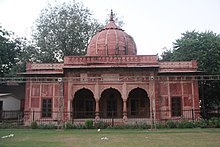Lal Bangla



Lal Bangla are two imperial late-Mughal mausoleums located in Delhi, India, that are that protected monument under the Archaeological Survey of India.[1]
Overview
[edit]Lal Bangla has two tombs made of red and yellow sandstone. One of which is the tomb of Lal Kunwar (Imtiazi Mahal), wife of Mughal Emperor Jahandar Shah (1661 - 1713) and his daughter Begum Jan.
Both mausoleums consist of square rooms at diagonals with oblong halls between them. The mausoleum stands on a red sandstone platform with rooms at corners. The dome of the mausoleum is in the late Mughal style and has a pinnacle at the top. The mausoleums share architectural similarities with the use of red and yellow sandstone of the Tomb of Safdarjung.
The adjoining enclosure has three tombs belong to the family of emperor Akbar II (1806-1837). The buildings are within the premises of the Delhi Golf Club and is not accessible to general public.[2]
Also located within the complex is the tomb of Syed Abid, which was built in 1036 AH ( approx. 1626 CE). Sir Syed Ahmed Khan's seminal work on the monuments of Delhi, Aasar Us Sanaadeed mentions Syed Abid as an associate of Khan Dauran Khan, one of Shahjahan's leading soldiers.
History
[edit]Lal Bangla is one of the most noteworthy and interesting historical monuments of the Mughal period. There is a debatable matter about the identification of the character who is buried down under the structure of Lal Bangla. A large number of historical researches suggests that the mausoleum belongs to the daughter and mother of a Mughal emperor named Shah Alam. The name of the daughter of Shah Alam is known to be Begam Jaan and of his mother as Zinat Mahal Sahiba or Lal Kunwar.[3]
See also
[edit]- List of Monuments of National Importance in Delhi
- Tomb of Mariam-uz-Zamani, resting place of Empress Mariam uz-Zamani, consort of Emperor Akbar
- Tomb of Nur Jahan in Lahore, resting place of Empress Nur Jahan, consort of Emperor Jahangir
- Roshanara Bagh in Delhi, resting place of Roshanara Begum, second daughter of the Emperor Shah Jahan
References
[edit]- ^ List of Monuments of National Importance as published by the Archaeological Survey of India.
- ^ City, So (16 June 2021). "The Ancient Lal Bangla Lies Neglected Within The Glossy & Posh Delhi Golf Club". So City. Retrieved 1 October 2021.
- ^ "Lal Bangla New Delhi India History & Architecture". www.astrolika.com. Retrieved 27 September 2021.
External links
[edit]![]() Media related to Lal Bangla at Wikimedia Commons
Media related to Lal Bangla at Wikimedia Commons
